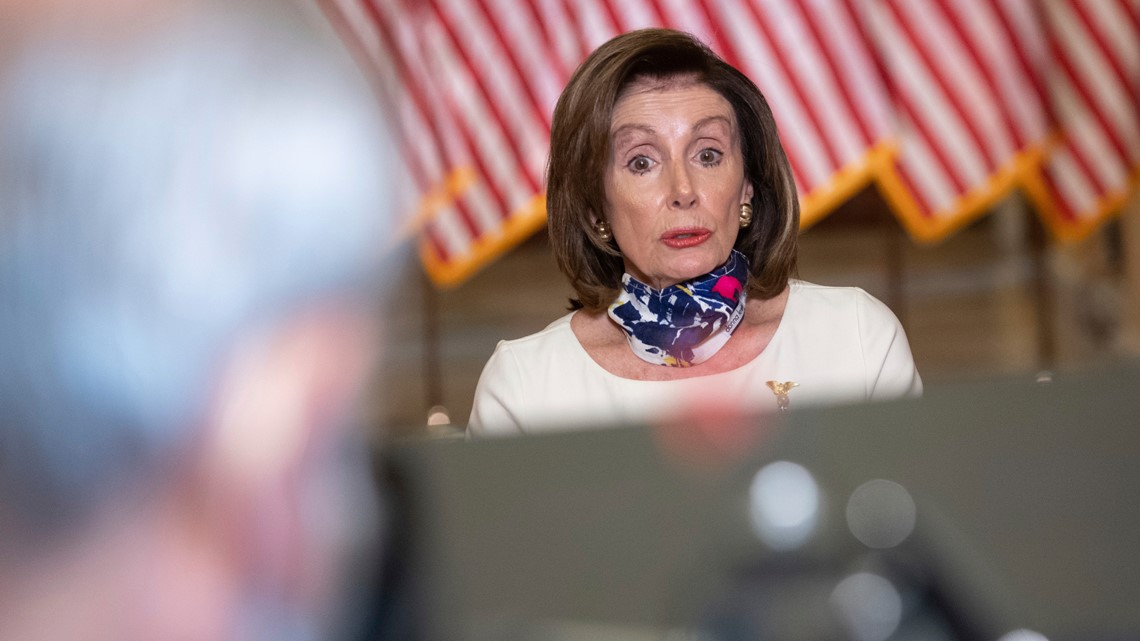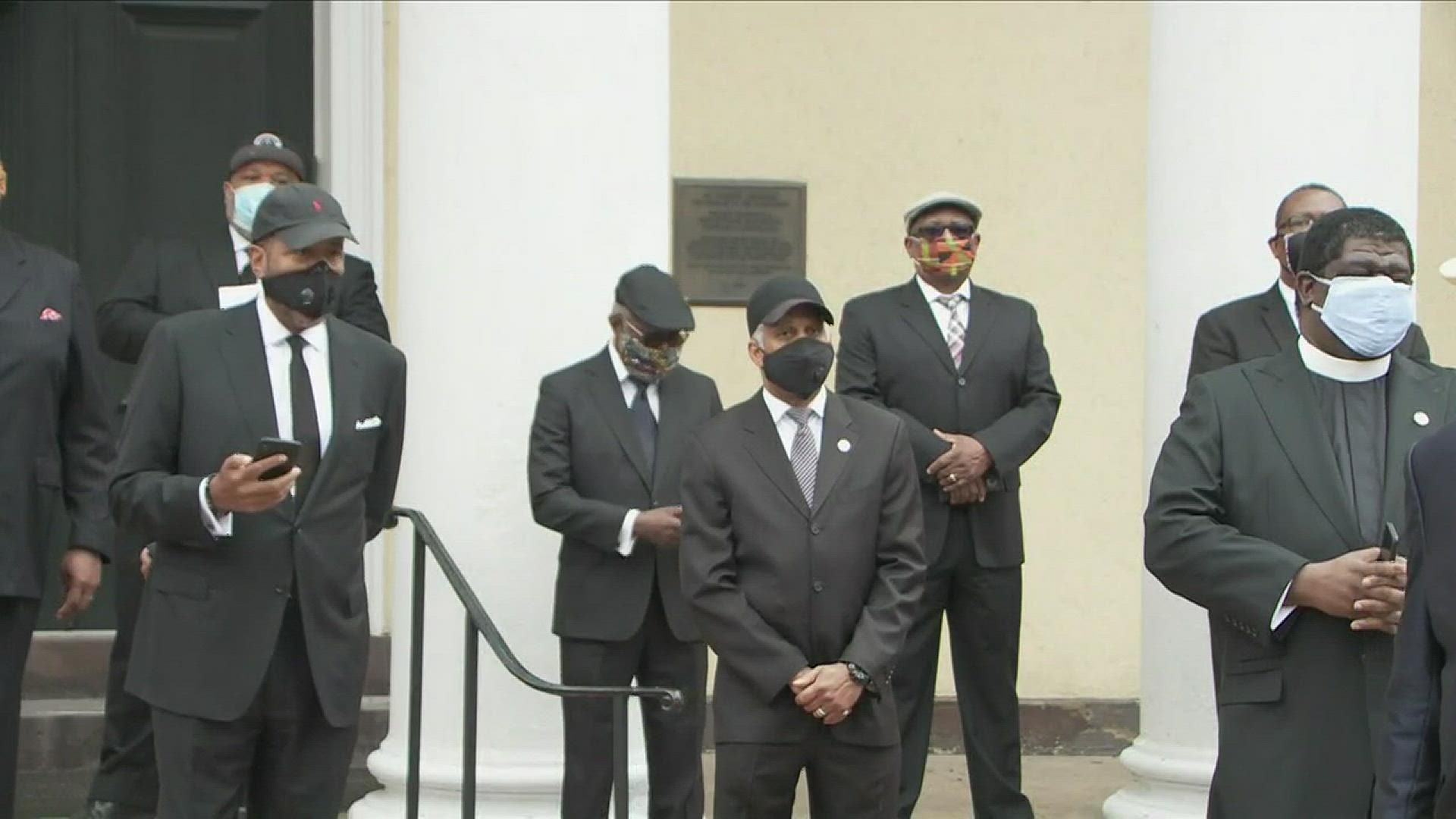WASHINGTON — House Speaker Nancy Pelosi on Tuesday called on President Donald Trump to be a “healer in chief” and not a “fanner of the flame” as the nation reels from mass protests over the treatment of black people in the United States.
Reading from Bible scripture at the Capitol, Pelosi drew on past presidents — including George H.W. Bush speaking in the aftermath of the Rodney King unrest and Barack Obama following the death of Eric Garner — as models of the nation's chief executive at a time of crisis.
“We would hope that the president of the United States would follow the lead of so many presidents before him to be a healer in chief and not a fanner of the flame,” Pelosi said.
The remarks of the California Democrat, who is the party's top ranking elected official, offered a stark contrast to the Republican president as the world watches a nation in turmoil.
Pelosi criticized the use of force to disperse the crowd of protesters late Monday at the White House so Trump could cross the street to nearby St. John's church in what was widely seen as a photo opportunity and was later criticized by the Episcopal congregation's bishop.
“Some people came out and beat them so they could clear the area so the president could come out and go forward. What is that?” asked Pelosi. “That has no place and it's time for us to do away with that.”
Pelosi, a Catholic who regularly attends Mass, said there were so many passages that Trump could have relied on during his visit to the church. He held up a Bible during the event but did not refer to it during brief remarks. She quoted from the book of Ecclesiastes, saying it is a “time to heal.”
“It is the responsibility of all of us to take the time to heal,” she said.


At the partly closed Capitol, Congress already struggled with the COVID-19 outbreak is now confronting a deepening crisis after the death of George Floyd during a police stop in Minnesota.
House and Senate lawmakers are swiftly crafting legislation to address police violence, end racial profiling and confront the inequities facing black Americans.
The Congressional Black Caucus announced a virtual town hall Friday with civil rights leaders, and House Judiciary Committee chairman Jerrold Nadler said the panel is planning a hearing next week on policing, officials said.
The civil unrest over the death of Floyd at the hands of police combined with the coronavirus pandemic that's disproportionately striking African Americans sparked an urgent plea for understanding from some leaders.
Notably, Senate Majority Leader Mitch McConnell on Monday read into the Senate record the names of black people who have died in recent confrontations. George Floyd. Ahmaud Arbery. Breonna Taylor.
“To me,” McConnell, R-Ky., said in a speech in the Senate chamber, and to “millions of outraged Americans, these disturbing events do not look like three isolated incidents. They look more like the latest chapter in our national struggle to make equal just and equal protection under the law a fact of life for all Americans."
As protesters gathered outside the Capitol, still partly locked down due to the coronavirus, the dual crises tested Washington. Some lawmakers urged comity and federal aid to prevent the country from slipping into further conflict. Others sided with Trump's threat to use military force if necessary to end the protests.
There was a shift in tone as even some conservatives who in the past have countered “Black Lives Matter” protests with “Blue Lives Matter” support for law enforcement acknowledged the concerns. After countless incidents of police being called to investigate black people doing ordinary things — most recently when a white woman in New York summoned 911 over an African American bird watcher in Central Park — many lawmakers agreed public attitudes and police tactics need review.
Yet, some Trump allies pushed for a show of military action to quell the protests now stretching into their sixth day.
“Anarchy, rioting, and looting needs to end tonight,” tweeted Sen. Tom Cotton, R-Ark. He suggested bringing in the 101st Airborne — an elite Army unit — to confront outside agitators influencing the protests.
McConnell also suggested if state and local leaders can't secure safety, "I hope the federal government is ready to stand in the breech.”
Trump's remarks focusing on the possibility of using the military in response to violent protests, coming as military police and law enforcement clashed with protesters near the White House, were widely criticized. Rep. Jason Crow, D-Colo., a former Army Ranger who served in Iraq and Afghanistan, said: "These are not the actions of a rationale, fit, democratic president. They are the actions of a man who doesn’t respect the core values of our nation.”
Protests over Floyd's death hit a nation already in crisis over the virus outbreak and economic shutdown that has left 41 million Americans filing for unemployment benefits as Congress struggles to respond.

